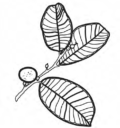..
.
Our Story & Objectives
Forest Commons (formerly called Arbres Sauveurs) aims to develop innovative interdisciplinary reforestation and agroforestry projects, centred around tree species that help local and vulnerable communities achieve longterm food security and overall well-being, that revitalise the natural environment and biodiversity, and that work to offset the adverse effects of climate change.
Stemming from a strong science-based background, guided by the principals of biomimicry, and adhering to our core premise of strengthening the human-nature connection, Forest Commons focuses on the reintegration of important multifunctional trees into local culture and ecology through the creation of small-scale agroforestry projects, which respond to the nuanced needs of the regions in which and communities with whom we work, namely in Haiti, Mexico, India and France.
Among such multifunctional trees, we place particular emphasis on oxalogenous trees – a unique set of tree species which have the ability to sequester atmospheric carbon not only in their wood, but also by transforming it (in symbiosis with funghi and bacteria) into calcium rock in the soil around their root systems, where they can store the carbon for at least tens of thousands of years!
The Mayanut Tree (MNT) serves as a pivotal species in our projects in Haiti and Mexico. In addition to possessing strong oxalogenous capacities, the Mayanut produces a highly nutritious nut that can help ensure local community food sovereignty longterm and offset the negative effects of climate change on traditional farming methods.
In addition to our agroforestry projects, we have recently developed a carefully-calculated atypical carbon compensation partnership strategy, harnessing the sequestration benefits of oxalogenous trees and favouring meaningful relationships with individuals and small organisations.
By responding to the pressing issues of our time, our programme’s actions help reinforce ecological and social resilience, one seed at a time.
Discover a short presentation of our programme (in French) created by the documentary series “Nature=Futur !”, which is dedicated to bio-inspired projects. This video was made in 2015 with the programme’s old name, Arbres Sauveurs.
